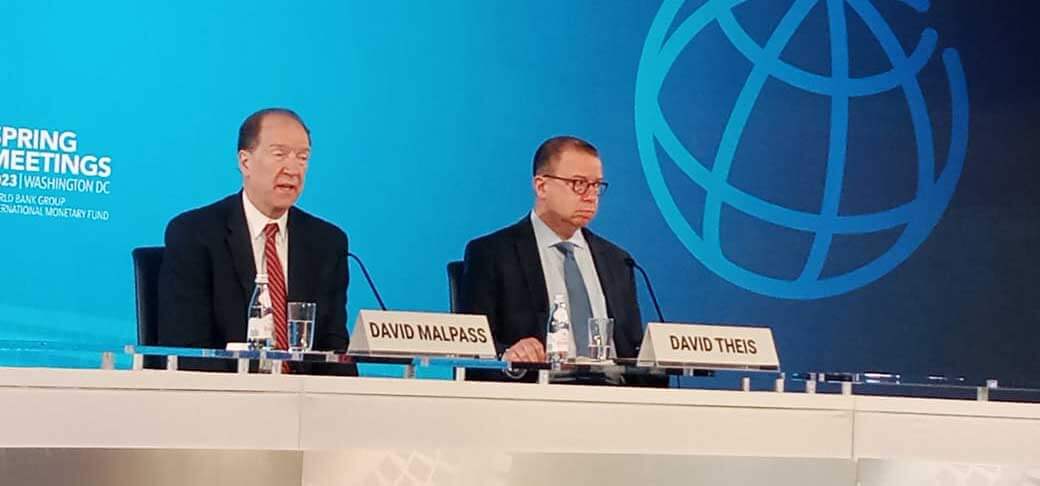What Tinubu Must Do To Reduce Poverty, Grow Nigeria’s Economy—World Bank
…Over 96 Countries Got $300bn From IMF For Covid-19 Funding
WASHINGTON D.C: The World Bank Group on Thursday urged the President-Elect, Bola Tinubu to ensure a productive economy for Nigeria to enable his administration effectively tackle the rising poverty rate in the country.
Advertisement
The World Bank President, David Malpass said this while responding to a question on his expectations for the Nigerian economy as the country changes leadership on May 29, this year.
About 133 million Nigerians, representing 63 per cent of the population are currently living in multi-dimensional poverty, according to the National Bureau of Statistics.
Of the total, 105.98 million poor Nigerians are located in rural areas compared to 16.97 million in urban areas.
In August 2019, President Muhammadu Buhari committed to empowering an additional 100 million people to escape extreme poverty by 2030.
Advertisement
This implied that on average, 10 million people must be lifted out of poverty each year, starting in 2020.
However, with the adverse impact of the COVID-19 pandemic on livelihoods, and unemployment, the challenge was more evident.
According to the Nigeria Multidimensional Poverty Index (MPI) 2022 Survey, which was release by the statistical agency, there are high deprivations in sanitation, time to healthcare, food insecurity, and housing.
The International Monetary Fund (IMF) had retained its growth forecast of 3.2 percent for Nigeria’s economy in 2023.
But when asked what would be the World Bank economic recommendations for Nigeria as Tinubu takes over next month, Malpass said for Nigeria to achieve inclusive growth that would help reduce poverty, the new government most ensure a more productive economy.
Advertisement
He also said the Nigerian economy needs to be more diversified away from crude oil, adding that the current issue of insecurity along the northern region must be tackled.
The World Bank Boss also called for the removal of trade protection that blocks the market development base, effectively tackling the exchange rate issues as well as high inflation rate that is affecting the diversification of the economy.
Malpass said, “Our priority at the world bank is shared prosperity in the most sustainable way, and we think for Nigeria, there are many changes that are needed to allow that process. A huge chunk of Nigeria’s GDP is oil. This means that a lot of people in Nigeria are facing poverty, insecurity along the northern western region, and that is very challenging.
“They need to have an economic system that will be more productive, this means that Nigeria has a trade protection that blocks the market development base, and they have a low exchange rate that is very expensive for the people of Nigeria, high inflation that is affecting the diversification of the economy to push the country progress.”
Meanwhile, the Managing Director of the International Monetary Fund, Kristalina Georgieva, said the world economy has proven remarkably resilient to the multiple shocks of the last three years, but it is yet to overcome the combination of weak growth and sticky inflation.
She explained that global growth would slow down to 2.8 percent in 2023 and remain weak, at around 3 percent, over the next five years.
Advertisement
This she noted, is the weakest medium-term forecast in decades, adding that underlying inflation remains stubbornly high, geo-economic fragmentation affects trade and capital flows, and downsides risks have increased.
She said, “Fighting inflation and safeguarding financial stability have become more complex with the recent banking sector pressures.
“At the same time, we know that low-income countries are particularly vulnerable given high debts. As their per capita income growth lag, it is becoming harder and harder for them to catch up.
“We also need to step up international cooperation to reduce the harm from fragmentation. Our analysis shows that the long-term cost of trade fragmentation could be as high as 7 percent of global GDP.
“If we add technological decoupling, some countries could lose up to 12 percent of GDP. Fragmentation of capital flows, including foreign direct investment, would be another hit to global growth.”
According to her, since the outbreak of the Covid-19 pandemic, the IMF has provided about $300bn in new financing to 96 countries.
Within the last six months, the IMF Boss said that the Board has approved 23 new financing arrangements for member countries.
“Nearly half of our financing commitments in the past three years have been done through our precautionary facilities—like the one approved for Morocco last week.
“They serve as an additional buffer to countries with strong economic fundamentals. We have stepped up support for vulnerable middle-income countries—including through a temporary increase in the amount members can borrow from the IMF.
“And we have recently provided financing to countries such as Sri Lanka and Ukraine,” she added.



